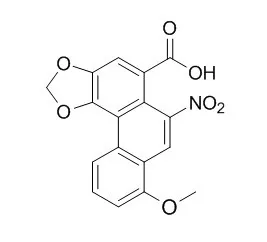| In vitro: |
| Chem Res Toxicol. 2014 Dec 15;27(12):2128-35. | | Aristolochic Acid A induces ovarian toxicity by inhibition of akt phosphorylation.[Pubmed: 25406029] | Aristolochic acids are natural products found in Chinese herbs of the Aristolochiaceae family. Aristolochic acid I (Aristolochic acid A,AAI) is a potent carcinogen and was found to be toxic in animal and clinical studies. Apoptosis is a rapid, selective process of physiological cell deletion that regulates the balance between cell proliferation and cell death and is induced by various kinds of damage. However, the toxicity of AAI during ovarian maturation in the mouse is unclear and is the subject of the present investigation.
METHODS AND RESULTS:
We used Chinese hamster ovary-K1 (CHO-K1) cells and an AAI injection mouse model: MTT assay was used to assess AA toxicity to cells; ovary size and weight were measured to determine the toxicity of AA to mouse ovary; western blot was used to assess apoptosis; TUNEL assay was used to evaluate apoptotic cell death; and immunohistochemistry was used to examine the local expression of apoptotic proteins in ovary tissue. We found that AAI significantly inhibits the viability of CHO-K1 cells and strongly induces apoptotic cell death in CHO-K1 cells and in mouse ovary. In addition, we observed that AAI markedly increases the expression of pro-apoptotic proteins, including Bax, caspase-3, caspase-9, and poly(ADP) ribose polymerase (PARP). In contrast, anti-apoptotic proteins, such as Bcl-2 and survivin, were decreased by AAI treatment. Furthermore, we observed that ovary size and weight were significantly reduced and that the number of ovulated oocytes was markedly suppressed in AAI-treated mice.
CONCLUSIONS:
These results suggest that AAI strongly induces toxic damage during ovarian maturation by inhibiting Akt phosphorylation-mediated suppression of apoptosis. | | Toxicol Lett . 2018 Jul;291:129-137. | | Aristolochic acid I interferes with the expression of BLCAP tumor suppressor gene in human cells[Pubmed: 29655784] | | Abstract
Aristolochic acid I (AAI) is a phytocompound that is linked to the progressive renal disease and development of human urothelial carcinoma. The bladder cancer-associated protein (BLCAP) gene exhibits a tumor suppressor function in various tumors, including bladder carcinoma. This study evaluated the effect of AAI on BLCAP expression and its associated mechanism in human cells. Administering AAI to human embryonic kidney cells (HEK293), human proximal tubule epithelial cells (HK-2) and urinary bladder cancer cells (HT-1376) significantly reduced the expression of BLCAP mRNA and protein. AAI also effectively suppressed the luciferase activities driven by BLCAP promoters of various lengths in HEK293 cells. AAI significantly reduced both activator protein 1 (AP-1) and nuclear factor-κB (NF-κB) activities in reporter assays, but further point mutations revealed that Ap-1 and NF-κB binding sites on the BLCAP promoter were not AAI-responsive elements. Application of the DNA methyltransferase inhibitor, 5-aza-2'-deoxycytidine (5-aza-dC), reversed the decline of BLCAP expression that had been induced by AAI. However, AAI exposure did not alter hypermethylation of the BLCAP promoter, determined by methyl-specific polymerase chain reaction (PCR) and bisulfate sequencing. Knocking down BLCAP in HEK293 cell line enhanced the potential for cellular migration, invasion, and proliferation, along with the induction of a capacity for anchorage-independent growth. In conclusion, AAI down-regulated the expression of BLCAP gene and the deficiency in BLCAP expression contributed to the malignant transformation of human cells, implying that BLCAP may have a role in mediating AAI-associated carcinogenesis.
Keywords: Aristolochic acid; BLCAP; Bladder cancer associated protein; Carcinogenesis; HEK293. |
|
| In vivo: |
| Zhong Yao Cai. 2010 Aug;33(8):1228-33. | | The determination of aristolochic acid A in different processed Aristolochia manshuriensis and the test of influence about renal function in rats.[Pubmed: 21213532] | To study and approach the processing methods and mechanism which can markedly reduce the content of aristolochic acid in Aristolochia manshuriensis and lighten the nephrotoxicity of aristolochic acid.
METHODS AND RESULTS:
A traditional "attenuation" processing method was used and 30 types of samples which contain one crude and 29 types of processed sample were obtained. The contents of Aristolochic acid A in every sample were determined by HPLC. According to the Rat's acute renal injury test, the influence of animal's renal function was investigated for representative samples.
The content of aristolochic acid in six types of samples depressed markedly (30% or more depressed) which processing with boiling in the limewater, steaming with limewater, boiling in the juice of liquorice, boiling in the decoction of black soybean, boiling in the soda water and stir-baked with talcum powder, the content of aristolochic acid in other processed samples also depressed with a large discrepancy. The toxicology test results showed that the above-mentioned 6 samples all can relieve renal injury of rats. There could be some associativity between the degree of renal injury relieving and the content of Aristolochic acid A in the samples.
CONCLUSIONS:
The content of aristolochic acid can be reduced and the nephrotoxicity for animals can be lightened with some eligible processing methods for the traditional Chinese medicines containing aristolochic acid with the representative of Aristolochia manshuriensis. |
|






 Cell. 2018 Jan 11;172(1-2):249-261.e12. doi: 10.1016/j.cell.2017.12.019.IF=36.216(2019)
Cell. 2018 Jan 11;172(1-2):249-261.e12. doi: 10.1016/j.cell.2017.12.019.IF=36.216(2019) Cell Metab. 2020 Mar 3;31(3):534-548.e5. doi: 10.1016/j.cmet.2020.01.002.IF=22.415(2019)
Cell Metab. 2020 Mar 3;31(3):534-548.e5. doi: 10.1016/j.cmet.2020.01.002.IF=22.415(2019) Mol Cell. 2017 Nov 16;68(4):673-685.e6. doi: 10.1016/j.molcel.2017.10.022.IF=14.548(2019)
Mol Cell. 2017 Nov 16;68(4):673-685.e6. doi: 10.1016/j.molcel.2017.10.022.IF=14.548(2019)